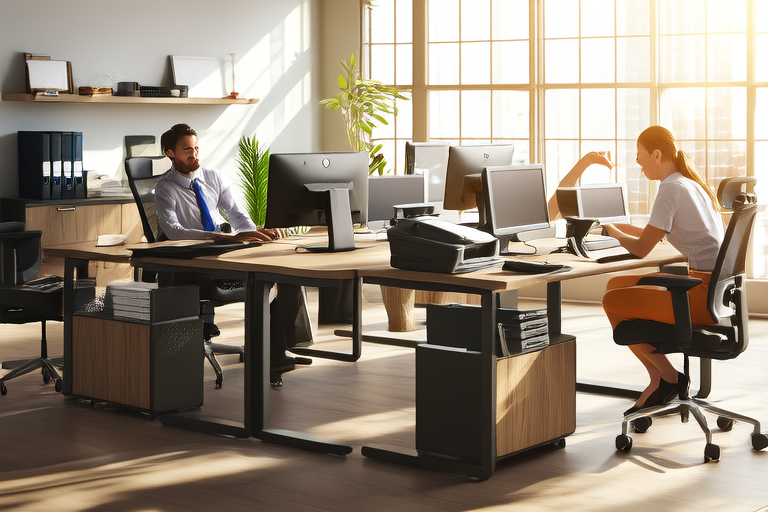How to Choose the Best Office Equipment That Fits Your Business Needs
Introduction: The Importance of Selecting the Right Office Equipment
Choosing the right office equipment is crucial for any business, as it can significantly impact productivity, efficiency, and overall operational costs. The wrong choice could lead to unnecessary expenses, downtime, and even employee dissatisfaction. On the other hand, investing in high-quality, well-suited office equipment can streamline workflows, enhance collaboration, and improve the overall work environment. In this article, we will explore how to select the best office equipment that fits your business needs, covering key factors such as budget, functionality, and long-term value.
Understanding Your Business Needs
Before you start shopping for office equipment, it’s essential to have a clear understanding of your business requirements. This step ensures that you make informed decisions and avoid purchasing items that may not be necessary or suitable for your operations.
Assess Current Workflows
Take a close look at your current workflows and identify areas where office equipment could improve efficiency. For example, if your team spends a lot of time printing documents, you might need a faster printer with higher paper capacity. If your employees frequently travel or work remotely, consider investing in portable devices like tablets or lightweight laptops.
Consider Future Growth
When selecting office equipment, think about the future growth of your business. Will your current setup scale easily as your company expands? For instance, choosing multifunctional printers (MFPs) that can handle both printing and scanning tasks can save space and reduce the need for additional equipment down the line. Similarly, cloud-based software solutions can accommodate more users as your workforce grows without requiring significant hardware upgrades.
Evaluate Employee Needs
The comfort and productivity of your employees should also influence your decision-making process. Ergonomic chairs, adjustable desks, and noise-canceling headphones can help create a more comfortable and focused work environment. Additionally, providing adequate technology access—such as reliable computers and internet connections—can boost morale and performance.
Key Factors to Consider When Purchasing Office Equipment
Once you’ve identified your business needs, there are several critical factors to consider when making your purchase.
Budget Constraints
Setting a realistic budget is one of the most important steps in choosing office equipment. While it’s tempting to go for the latest and greatest gadgets, it’s equally important to stay within your financial limits. Start by determining how much money you can allocate for each piece of equipment and stick to that figure. Remember, quality doesn’t always mean expensive; sometimes, mid-range options offer excellent performance at a lower cost.
Functionality and Compatibility
Ensure that the equipment you choose meets your specific functional requirements. For instance, if your business relies heavily on data entry, look for keyboards with ergonomic designs and tactile feedback. Additionally, verify compatibility between different devices to prevent integration issues. For example, ensure that new printers can connect seamlessly with existing network systems.
Durability and Maintenance
Investing in durable office equipment can save you money in the long run by reducing repair costs and downtime. Look for products built from high-quality materials and designed for heavy use. Also, check the availability of spare parts and support services, as these can affect maintenance costs. Some manufacturers offer extended warranties or service contracts that provide peace of mind and additional protection against unexpected repairs.
Practical Tips and Case Studies
To help illustrate the concepts discussed above, let’s examine two real-world scenarios involving small businesses.
Scenario 1: A Law Firm
A law firm recently expanded its practice and needed to upgrade its office equipment. After careful consideration, they opted for laser printers capable of handling large volumes of legal documents efficiently. They also invested in ergonomic chairs and standing desks to promote better health among their staff. As a result, the firm saw an increase in productivity and improved employee satisfaction.
Scenario 2: An E-commerce Startup
An e-commerce startup required reliable computers and internet connectivity to manage their online store effectively. They chose lightweight laptops equipped with powerful processors and ample storage capacity. To ensure uninterrupted service, they partnered with a reputable ISP offering robust fiber-optic connections. This investment allowed them to handle increased traffic during peak sales periods without experiencing slowdowns or crashes.
Conclusion: Making Smart Decisions About Office Equipment
In conclusion, selecting the best office equipment requires careful planning and research. By understanding your business needs, considering key factors like budget constraints and functionality, and learning from practical examples, you can make smart decisions that benefit your organization. Remember, the goal is not just to acquire the latest technology but to find solutions that enhance productivity, foster collaboration, and ultimately drive success. Take the time to evaluate your options thoroughly before making any purchases, and don’t hesitate to consult with experts if needed. Happy shopping!
